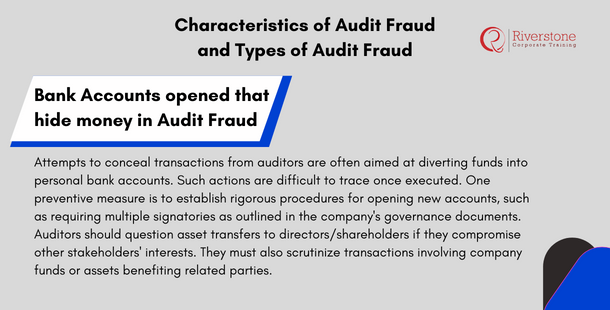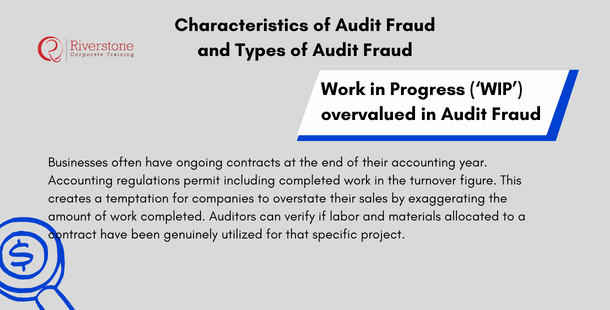
How is Audit Fraud Detected?
What is Audit Fraud?
- Audit fraud is a concerted attempt by the management of an entity to misstate the Financial Statements for audit fraud.
- It can also refer to instances where Directors/shareholders/employees make false statements to Auditors, which would impact the Audit opinion given by the Auditors or a reader of the accounts trying to understand the organization and its prospects.
How does Audit Fraud happen?
It’s the management’s responsibility to prepare the Accounts for a particular period, usually a year. The Auditor then must make certain checks on the validity of the numbers and narrative within the Accounts.
However, the Auditors are by no means required to check every figure – it would not be practical to do so as the accounts are the sum of all transactions that the company has entered into over the course of a year – often thousands of expenses paid, sales invoices issued, monthly wages paid after-tax deductions, etc.
The Auditor carries out their statutory duties by sampling transactions recorded in the business’ records to see if they accurately reflect the underlying documentation. The Auditor will also rely on written and oral representation from the Directors, often when there is uncertainty regarding estimates included in the Financial Statements. This process highlights the role of financial auditing in business decisions, as the findings from audit procedures can influence strategic direction, risk management, and stakeholder confidence.
Characteristics of Audit Fraud and Types of Audit Fraud
Perhaps it’s worthwhile considering a few instances where Auditors have been caught out in the past.
-
Bank Accounts opened that hide money in Audit Fraud.
- It is often done to obstruct Auditors from finding out about certain transactions or so that those hiding the funds can pass the money over to their own Bank account. This has happened once too often, and it’s not very easy to track once it has taken place. One way to try to protect the company against this is to have robust processes for opening new accounts – for example, including in the company’s governance documents (Articles and Memorandum of Association) that multiple signatories are required to open accounts.
- Assets transferred to Directors/shareholders’ names/ownership – at values that compromise other shareholders. Auditors should challenge valuations where Assets are sold or purchased by the company. It should also be wary of any transactions benefiting related parties from the Companies funds or assets.
-
Work in Progress (‘WIP’) overvalued in Audit Fraud
- Many businesses work on contracts that are ongoing at the company’s accounting year-end. Accounting rules allow for activities to include in their turnover (sales) figure the amount of completed work. Therefore, it’s easy to see how companies might want to represent more work done than there is, hence inflating the sales figure for the year. Auditors can test that labour and materials charged to the work have been spent on that particular contract.
The Determination of Fraud of Financial Statements by Auditors
Concentrate on practical signs and indicators that auditors are on the lookout to determine the existence of potential financial statement fraud. This material will list some typical schemes such as false revenues or underreported expenses and offer practical hints as to how it is possible to detect irregularities in the financial information and why analytical work and professional scepticism are so important.
This is especially relevant in understanding how auditors detect financial statement fraud Singapore, where regional standards and regulatory expectations must also be considered. As part of a comprehensive learning experience, this topic is also covered in our eLearning module for detecting financial statement fraud, ideal for professionals seeking structured training. In conjunction, it’s vital to understand what does auditor opinion mean in financial reports Singapore to fully interpret audit findings and assess the financial integrity of an entity.
Development of an Effective Anti-Fraud Culture
Explain the significance of cultivating an ethical and transparent organizational culture as the method of avoiding frauds. This material will not only deal with compliance but consider how leadership, training employees, having clear communication lines, powerful whistleblower system can contribute to establishing a fraud system that is less prone to fraud and more likely to report it.
Conclusion in Audit Fraud
What can Investors/users of accounts do to protect themselves against the risk of Audit Fraud?
Ultimately readers of financial accounts should use their knowledge of business to back up what they are reading. Some of the warning signs are company is performing well in a sector where others are struggling or if the Director’s comments too bullish compared to other similar companies or if the company margins are unusually high, or if a company’s Accounting Policies seem to be more aggressive than others, etc. These can all be warning signs that something is amiss.



